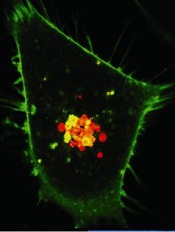
Credit: PNAS
A 2-drug combination can overcome Mcl-1-dependent treatment resistance in multiple myeloma (MM), preclinical research suggests.
The therapy consists of the Chk1 inhibitor CEP3891 and the MEK1/2 inhibitor PD184352.
Chk1 inhibitors prevent cells from arresting in stages of the cell cycle that facilitate DNA repair. And MEK inhibitors prevent cells from activating proteins that regulate DNA repair, while promoting the accumulation of pro-apoptotic proteins.
Researchers recounted their results with the 2 inhibitors in PLOS ONE.
The team noted that, although several drugs are effective against MM, the cancer cells can often survive treatment by increasing production of Mcl-1. This protein regulates processes that promote cell survival and has been implicated in resistance to bortezomib and other anti-myeloma drugs that were initially effective.
With their experiments, the researchers discovered that CEP3891 and PD184352 can reduce Mcl-1 expression and disrupt its interactions with other proteins to effectively kill MM cells.
“This research builds on our previous studies that showed exposing multiple myeloma and leukemia cells to Chk1 inhibitors activated a protective response through the Ras/MEK/ERK signaling pathway,” said Xin-Yan Pei, MD, PhD, of Virginia Commonwealth University and the Massey Cancer Center in Richmond.
“By combining a Chk1 inhibitor with a MEK inhibitor, we have developed one of only a limited number of strategies shown to circumvent therapeutic resistance caused by high expressions of Mcl-1.”
The team began this research by forcing overexpression of Mcl-1 in human MM cells. This caused the cells to become highly resistant to bortezomib, but it failed to protect them from CEP3891 and PD184352.
Furthermore, CEP3891 and PD184352 completely overcame resistance due to microenvironmental factors associated with increased expression of Mcl-1.
“Not only was the combination therapy effective against multiple myeloma cells, it notably did not harm normal bone marrow cells, raising the possibility of therapeutic selectivity,” said study author Steven Grant, MD, also of Virginia Commonwealth University and the Massey Cancer Center.
“We are hopeful that this research will lead to better therapies for multiple myeloma and help make current therapies more effective by overcoming resistance caused by Mcl-1.”
The researchers have started initial discussions with clinical investigators and drug manufacturers about a clinical trial testing a combination of Chk1 and MEK inhibitors in patients with refractory MM.

